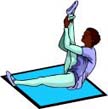 |
 |
 |

Home
 Information
Information
Click the buttons above to get the course lecture schedule, etc.Chemistry C105/C111General information Spring 2001
INSTRUCTOR
REQUIRED MATERIALS 1. Brown, LeMay and Bursten (BLB), Chemistry, The Central Science (Eighth Edition) Prentice Hall, 2000. 2. Calculator (battery or solar powered) with logarithms, trigonometric functions, and scientific notation. 3. Gosser, Strozak, Cracolice and Blake, Workshop Chemistry: General Chemistry Semester I, 2001 RECOMMENDED MATERIALS 1. James C. Hill, Student's Guide to accompany BLB, Prentice Hall, 2000. 2. Thomas Gardner, Media Companion to accompany BLB, Prentice Hall 2000 3.Long, Long and Lewis, Math Review Toolkit to accompany BLB, Prentice Hall, 2000 4. R. Wilson, Solutions to Black Exercises to accompany BLB, Prentice Hall, 2000. 5. Brumlik, Framework Molecular Model Set, Prentice Hall, 2000 6. Blake, Nomenclature Flashcards 2000-2001 Recommended Materials 1, 2 and 3 come with textbook package 1. Items 1-5 come with textbook package 2. PREREQUISITES Two years of high school algebra and one year of high school chemistry (or their equivalents) are prerequisites for this course. If you are not comfortable doing algebra, prepare to do extra work during the term to compensate for this deficiency.
PRE-LECTURE WARM-UP EXERCISES Answers to Warm-up Exercises are due prior to each lecture period. Warm-up exercises can be found via http://chem.iupui.edu, if you click on "Course Information" and then C105/C111 Principles of Chemistry I These exercises will allow the instructor to focus on material that is particularly useful or interesting to the class and to address particular problems that students have with chemistry concepts. In addition to the pre-class exercises, extra credit will be available via the WWW also. LECTURES Lectures provide an organized overview of the subject, and a discussion of why chemistry is important from the perspective of an expert chemist. In addition, important example problems will be solved during lectures and the interconnections between concepts will be described. On average, students who attend lecture always do better on the examinations than the students who do not attend lectures regularly. That’s a fact that you should remember when making daily decisions. RECITATIONS Prompt attendance at recitation sections is mandatory for all C105/C111 students. The recitations for C105/C111 are two-hour "Workshops" in which students in the course will practice doing challenging problems collaboratively. Chemistry content, communication skills and good teamwork practices will be emphasized in these peer-led sessions. If you ever miss a workshop session due to a legitimate, documentable problem, notify Dr. Blake immediately and provide a copy of the documentation for the class records.
HOMEWORK An integral part of the study of chemistry is mastery of problem solving skills You cannot expect to do well on examinations if you do not master problem solving. Completion of the assigned problems provides a minimum of preparation for class, recitation and exams, and working many additional problems (under exam conditions) is strongly encouraged. It is recommended that you do 2-3 problems per day, five days a week, during the term. They are less painful if you do them with a friend or two. Examinations
Four multiple-choice examinations and a comprehensive multiple-choice final examination are scheduled during the semester. The four interactive computer examinations will be taken in room LD 225. Each of the semester exams may be taken on any one of the three scheduled days. Examination times are available on a first-come first-served basis. A maximum time of two hours is allowed for completing each of these exams. You are encouraged to take the exams early in the exam period to avoid potential conflicts. A picture ID card will be required for all students when they take the examinations. Tentatively, the midterm exam hours are F 10-5, Sat 10-6 and Sun 10-8 PM. Students must begin the exam at least two hours before the end of the exam hours! ALL STUDENTS ENROLLED IN THE C105 AND C111 COURSES WILL TAKE THEIR FINAL EXAM FROM 8:00-10:00 AM ON THURSDAY, MAY 3. The final examination is a comprehensive, multiple choice examination containing at least 50 questions that will require the use of paper and number 2 pencils. There will be no make-up examinations, except in cases of serious, documentable excuses. THE INSTRUCTOR MUST BE CONTACTED AS SOON AS THE CONDITION IS KNOWN FOR SPECIAL ARRANGEMENTS TO BE MADE.
Examination Schedule
TUTORING SERVICES The Department of Chemistry Tutoring Center is located in UC, and provides students a convenient "Walk-in" Center for help in C105/111the exact room and times will be announced in LECTURE.
REFERENCE MATERIALS
Sample Exams: Sample exams are available for you to take prior to the actual examinations. Please do not take the actual examinations prior to taking the practice examinations! They will help you get acclimated to the testing program and allow you to test yourself for content preparation. Take the sample exams once you feel you are ready for the real exam. The sample exams are most informative when taken under the same constraints as the real exams (2-hour time limit, no books or notes).
STUDENT RESPONSIBILITIES All students are required to attend lecture and workshop periods. In the event that a student misses any class, he or she is responsible for the material covered during that class. This includes changes to the syllabus and other course policies. Legitimate absences that may have impact on a student’s grade must be brought to Dr. Blake’s attention immediately for special arrangements to be made. All reasons for such absences must be documented in an appropriate manner. Cheating is a violation of university ethics regulations. Therefore, students who are caught cheating will receive a minimum penalty of a zero on the exam or assignment and may fail the course. The following is an excerpt from the university publication, "Student Rights and Responsibilities," Section III, 3.1: "Cheating-dishonesty of any kind with respect to examination, course assignments, alteration of records, or illegal possession of examinations shall be considered cheating. It is the responsibility of the student not only to abstain from cheating but, in addition, to guard against making it possible for others to cheat. Any student who helps another student cheat is as guilty of cheating as the student, he/she assists." Course Point Distribution AND GRADING
Letter grades in the C105 and C111 courses will be determined by the percentage of points that you accumulate in the class. The following cutoffs will be used to determine your course grade.
You will be guaranteed that the grade cutoffs will not be higher than those listed, but the instructor may choose to lower them should special conditions warrant such action. For example, if you earn 88% of the points you will receive at least an A- grade, 75% of the points warrants at least a B- grade, etc. Also, the instructor reserves the right to make grade adjustments in special cases as warranted by extraordinary circumstances. | ||||||||||||||||||||||||||||||||||||||||||||||||||||||||||||||||||||||||||||||||



